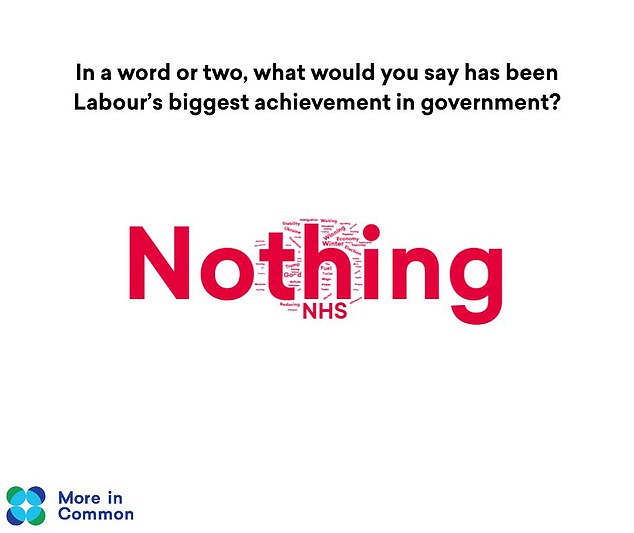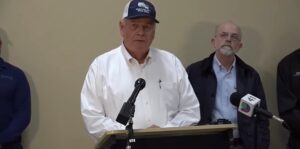
Voters have answered with a resounding ‘NOTHING’ when asked what has been the biggest achievement of Keir Starmer’s first year in power, a new poll shows.
More in Common asked voters to offer their one or two-word responses to Labour’s best and worst actions of the party’s first 12 months in power to create a word cloud.
And it was pretty brutal, with most people unable to thing of anything good.
Only its work on the NHS made much of a dent in people’s gloomy assessment.
On the flipside, they were very clear in what has gone wrong. The Winter Fuel Allowance row was far and away the biggest cock-up in people’s minds.
It saw Sir Keir and Chancellor Rachel Reeves try to take away the £300 universal benefit away from all but the poorest recipients, before being forced into a U-turn.
More in Common’s director Luke Tryl said it was ‘one of the most stark word clouds we’ve seen – the Winter Fuel Allowance drowns everything else out’.
The other major problem to stand out for voters was immigration, with more than 20,000 people already having crossed the English Channel in small boats this year, a record.

More in Common asked voters to offer their one or two-word responses to Labour’s best and worst actions of the party’s first 12 months in power to create a word cloud. And it was pretty brutal, with most people unable to thing of anything good.

On the flipside, they were very clear in what has gone wrong. The Winter Fuel Allowance row was far and away the biggest cock-up in people’s minds.
Sir Keir is facing Labour dissent, economic uncertainty and spiralling conflict abroad as he marks a year in Number 10.
The Prime Minister led his party back into power with more than 400 MPs on July 4 last year – clinching a majority just short of Sir Tony Blair’s landslide in 1997.
But with a daunting in-tray of problems including a stuttering economy, creaking public services and global volatility, his political honeymoon period was short-lived.
His personal popularity is now the lowest of any British premier after their first 12 months in office, political scientist and polling guru Professor Sir John Curtice said.
‘There were pretty clear potential weaknesses before they even started, and most of those weaknesses have basically just been exposed over the course of the last 12 months.’
Sir John said part of the problem lay in what he described as a failure of narrative in setting out the Government’s vision for change to the public.
‘They’re portraying themselves as a repair gang rather than the builders of a new Jerusalem. Pessimism doesn’t necessarily go down very well,’ he said.
‘The thing with Starmer is, he’s a brilliant prosecution lawyer… But prosecution lawyers present cases that have been (put together) by someone else. The problem is that as a political leader you’ve got to prosecute your own case.
‘Maybe he needs new personnel? Either he’s got to learn to do it himself or get someone in to do it for him.’
That verdict was echoed by some dissenting voices within Labour ranks, where there is lingering discontent among rebels over the Government’s Welfare Bill despite Number 10 offering major concessions on the legislation.

The Prime Minister led his party back into power with more than 400 MPs on July 4 last year – clinching a majority just short of Sir Tony Blair’s landslide in 1997.

His personal popularity is now the lowest of any British premier after their first 12 months in office, political scientist and polling guru Professor Sir John Curtice said.
The Government saw off the threat of a major Commons defeat over the legislation on Tuesday after shelving plans to restrict eligibility for the personal independence payment (Pip), the main disability benefit in England.
‘I think he really needs to think about why he wants to be a Labour Prime Minister and what is it he actually cares about,’ one long-serving Labour MP said.
They said Tuesday had marked ‘the lowest point’ in Sir Keir’s premiership so far and raised questions about his authority, warning that backbenchers may now feel emboldened to demand further U-turns elsewhere.
Sir John said that the Government’s challenges in passing legislation were unsurprising in light of the broad but fragile coalition of support on which Labour built its election victory, securing 412 seats on just 35% of the vote.
That means many MPs defending narrow majorities and raises the prospect of ‘a large body of people who are nervous about their political futures,’ he said.






